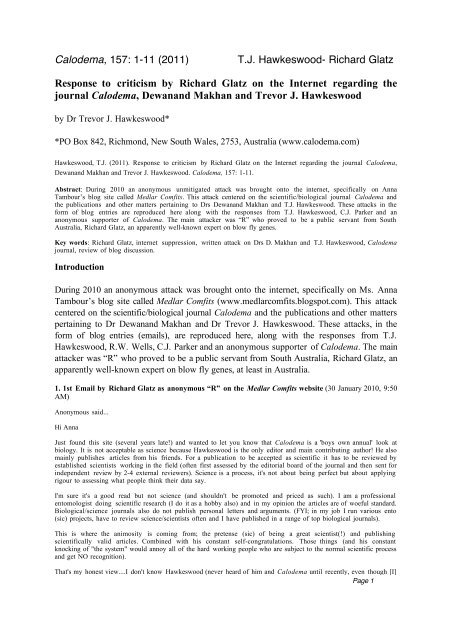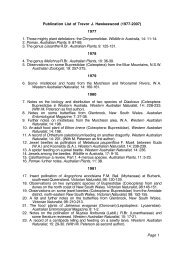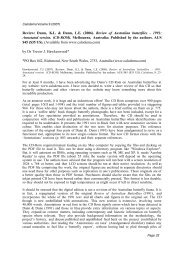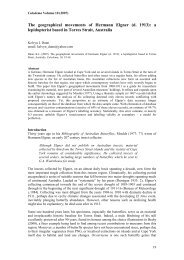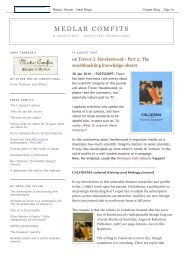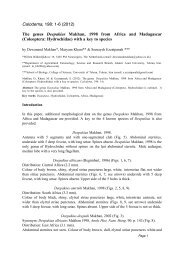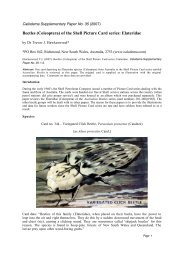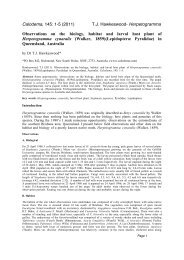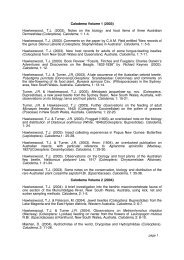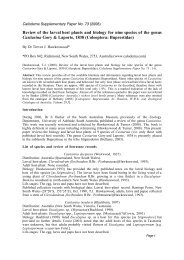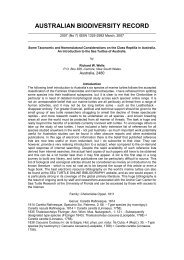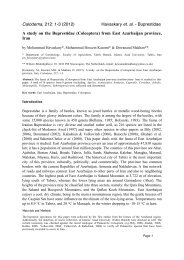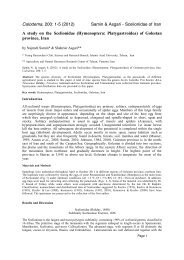Glatz criticisms.cwk (WP) - Calodema
Glatz criticisms.cwk (WP) - Calodema
Glatz criticisms.cwk (WP) - Calodema
Create successful ePaper yourself
Turn your PDF publications into a flip-book with our unique Google optimized e-Paper software.
<strong>Calodema</strong>, 157: 1-11 (2011)T.J. Hawkeswood- Richard <strong>Glatz</strong>Response to criticism by Richard <strong>Glatz</strong> on the Internet regarding thejournal <strong>Calodema</strong>, Dewanand Makhan and Trevor J. Hawkeswoodby Dr Trevor J. Hawkeswood**PO Box 842, Richmond, New South Wales, 2753, Australia (www.calodema.com)Hawkeswood, T.J. (2011). Response to criticism by Richard <strong>Glatz</strong> on the Internet regarding the journal <strong>Calodema</strong>,Dewanand Makhan and Trevor J. Hawkeswood. <strong>Calodema</strong>, 157: 1-11.Abstract: During 2010 an anonymous unmitigated attack was brought onto the internet, specifically on AnnaTambour’s blog site called Medlar Comfits. This attack centered on the scientific/biological journal <strong>Calodema</strong> andthe publications and other matters pertaining to Drs Dewanand Makhan and T.J. Hawkeswood. These attacks in theform of blog entries are reproduced here along with the responses from T.J. Hawkeswood, C.J. Parker and ananonymous supporter of <strong>Calodema</strong>. The main attacker was “R” who proved to be a public servant from SouthAustralia, Richard <strong>Glatz</strong>, an apparently well-known expert on blow fly genes.Key words: Richard <strong>Glatz</strong>, internet suppression, written attack on Drs D. Makhan and T.J. Hawkeswood, <strong>Calodema</strong>journal, review of blog discussion.IntroductionDuring 2010 an anonymous attack was brought onto the internet, specifically on Ms. AnnaTambour’s blog site called Medlar Comfits (www.medlarcomfits.blogspot.com). This attackcentered on the scientific/biological journal <strong>Calodema</strong> and the publications and other matterspertaining to Dr Dewanand Makhan and Dr Trevor J. Hawkeswood. These attacks, in theform of blog entries (emails), are reproduced here, along with the responses from T.J.Hawkeswood, R.W. Wells, C.J. Parker and an anonymous supporter of <strong>Calodema</strong>. The mainattacker was “R” who proved to be a public servant from South Australia, Richard <strong>Glatz</strong>, anapparently well-known expert on blow fly genes, at least in Australia.1. 1st Email by Richard <strong>Glatz</strong> as anonymous “R” on the Medlar Comfits website (30 January 2010, 9:50AM)Anonymous said...Hi AnnaJust found this site (several years late!) and wanted to let you know that <strong>Calodema</strong> is a 'boys own annual' look atbiology. It is not acceptable as science because Hawkeswood is the only editor and main contributing author! He alsomainly publishes articles from his friends. For a publication to be accepted as scientific it has to be reviewed byestablished scientists working in the field (often first assessed by the editorial board of the journal and then sent forindependent review by 2-4 external reviewers). Science is a process, it's not about being perfect but about applyingrigour to assessing what people think their data say.I'm sure it's a good read but not science (and shouldn't be promoted and priced as such). I am a professionalentomologist doing scientific research (I do it as a hobby also) and in my opinion the articles are of woeful standard.Biological/science journals also do not publish personal letters and arguments. (FYI; in my job I run various ento(sic) projects, have to review science/scientists often and I have published in a range of top biological journals).This is where the animosity is coming from; the pretense (sic) of being a great scientist(!) and publishingscientifically valid articles. Combined with his constant self-congratulations. Those things (and his constantknocking of "the system" would annoy all of the hard working people who are subject to the normal scientific processand get NO recognition).That's my honest view....I don't know Hawkeswood (never heard of him and <strong>Calodema</strong> until recently, even though [I]Page 1
<strong>Calodema</strong>, 157: 1-11 (2011)T.J. Hawkeswood- Richard <strong>Glatz</strong>work in entomological science, hence just found your blog). I don't know his friends or his "enemies" which seem tobe many. That's just what I think. Oh....his PhD comes from an "internet university" too (try find that out from hissite.....pretty basic thing..."What was your PhD in?").It's easy to burn down a house, yes. It's easy to pretend too.On the other hand, true scientific advances are hard. The complexity of science in the modern age is such that advancesare rarely are (sic) achieved by individuals. Usually by groups interacting and consisting of students, scientists,technical people etc etc.R [Richard <strong>Glatz</strong>]2. 1st Email from Dr T.J. Hawkeswood at Medlar Comfits in response to Richard <strong>Glatz</strong>’s firstanonymous Email (14 March 2010)Dear AnnaI wish to have the opportunity of reply to “R”’s rave on your blog. The statements made by him are mostly lies andinnuendo, meant to smear my scientific achievements and the authors of <strong>Calodema</strong>.I wish to put the record correct on a number of fronts.First the true identity of “R” is Richard <strong>Glatz</strong>, a “molecule molester” from South Australia who is not an entomologistbut a gene biochemist (as far as I can make out!). He apparently knows nothing about field work and traditionaldescriptive/taxonomic entomology.To date, the journal <strong>Calodema</strong> has published the works of over 15 authors, including biologists from overseas whom Ihave never met and whom are not necessarily my friends. Most of the papers ARE reviewed. The last paper of mine (theManwell letters) was reviewed by 6 (yes, six!) people, including an well-known academic from WollongongUniversity in New South Wales, a solicitor from New South Wales, an expert witness who is a crocodile scientist andthree other biologists in three States - Western Australia, New South Wales and Victoria. Some of the <strong>Calodema</strong> papersdo not require any extensive review as they are basically referrals to overlooked research etc. Over 200 papers havebeen published so far in <strong>Calodema</strong> and there are many in press. The published research in <strong>Calodema</strong> has been acceptedby most biologists throughout the world although there is always a little clique who don't like other scientists andwho (for vested interests and the guilt of their own unproductivity) will nit pick and put out excuses about thepublication of others’ works. Many of the papers in <strong>Calodema</strong> have been cited favourably in the works of others. Seee.g. referred papers on my website (which will be updated soon).As regards personal letters and comments, all good journals should do this as it stimulates thought and eliminatesinterior bias in refereeing and control by those editorial panels.<strong>Glatz</strong> believes that <strong>Calodema</strong> is a “boys own annual”- well that goes for every other journal in the world that isspecialised and uses referees to weed out competition from rival scientists and papers that are in conflict with theirown views or restricted scope of their particular journal. Most of the <strong>Calodema</strong> papers are available as free pdf filesfrom the www.calodema.com.I have been undertaking research in this country and overseas since 1965 and have published over 410 papers and 3books. The fact that <strong>Glatz</strong> hasn’t heard or seen works published by me shows just how ignorant he is! One of mybooks (Host plants of Chrysomelidae of the World with Dr P Jolivet of France) has been cited over 150 times. Myspider book (Spiders of Australia) saved the life of a person in Western Australia when they [person’s friends] wereable to positively identify a spider shown in a great colour photograph and thereby get the correct treatment [for thevictim].. MY papers have appeared in renowned entomological and botanical journals all over the world. Some of theresearch has been utilized by the USA Defence Department and the USA Agricultural Departments. It should be notedthat <strong>Glatz</strong> is in his early twenties and has published (since 2003 - 7 years) about 16 papers on molecules/genes ofblowflies and other lower creatures. Each of his papers have been written with many other authors - one of them has 14authors, thereby one cannot deduce <strong>Glatz</strong>'s input into such works!. In contrast, most of my papers have been writtenby myself.Incidentally at the same time as my journal (and all of its writers?) is being criticised, the great Edward O Wilson fromHarvard University is being criticised by underlings like <strong>Glatz</strong> in the USA and elsewhere who don't have the right tocriticize and should know better. The critics are also young people who are apparently jealous of the achievements andpublic exposure of the likes of older men such Wilson and myself and who are [therefore] very disrespectful. The clueto their jealousy is given for example in <strong>Glatz</strong>’s heated diatribe in this blog: (a) in his statement re. true scientificadvances are rarely achieved by individuals and (b) the statement regarding hard working people who are subject tothe (blah blah).... get NO recognition (!). Poor <strong>Glatz</strong> wants recognition but nobody out there is really interested in hisPage 2
<strong>Calodema</strong>, 157: 1-11 (2011)T.J. Hawkeswood- Richard <strong>Glatz</strong>scientifically of relatively little value. It's fine to do it but doesn't make you an expert because you wrote it all down.Unfortunately, Wells' comment about cushy grants etc etc is rubbish...I have to keep obtaining funding to keep over15 scientists on short-term contracts in work (cushy?!?), so apologies for not having the time to run around thecountryside making observations....we have to achieve stuff here, under real pressure and limited resources....like Isaid, I do my own field work privately (have a personal insect collection of over 15000 specimens...I don't have timeto describe the new ones or publish the associated observations...maybe later). So, I certainly don't look down on thissort of study but again, it's relatively unimportant scientifically and I don't consider racking up a plethora of minorobservational papers (or worse, those that are personal complaints) as a big deal. I think I just have a balanced viewabout science and what makes a real expert (it's certainly not someone who has to tell you they're one). So thecomment about not being able to live a day by TJs (sic) standards is waffle and I certainly am not ignorant of "howscience really works".By the way, I've had papers reviewed both positively and negatively; I just don't subscribe to the TJ fascistconspiracy ("The Club") rubbish.You may or may not hear a peep out of me again.....I've learned nothing from the coordinated (sic) defence of<strong>Calodema</strong> and stand by my earlier post. However, I am rather busy (with real consequences coming from my work), andtired of arguing about the basics. It has become an argument about people rather than process.I think enough time has been wasted on this....the broad scientific community can deal with these issues.R...the molecule monster (sic)5. Email from an anonymous reader, obviously supporting Dr TJHawkeswood, on the Medlar Comfitswebsite (18 March 2010)Anonymous said...Dr. Hawkeswood is a great scientist from Australia who has published more than 400 papers and 3 books, mainly in inbotany and entomology and other areas of biology. Richard <strong>Glatz</strong>'s photograph on his internet page is that of a 20year old and he claims to have published only 20 papers. Richard <strong>Glatz</strong>, now you are 40 years old really, when willyou publish 40 papers? <strong>Glatz</strong>, you have 15,000 specimens in your collection and do you know the genera. You cannot see new species and what you will do with your 15,000 specimens? You are a true molecule monster!!Friend of Dr T J Hawkeswood6. 2nd Email from TJHawkeswood on the Medlar Comfits website (21 March 2010)Dr TJHawkeswood said...Dear AnnaThank you so much for your commentary. Its so wonderful and exciting to be compared to Stephen Hawking and CraigVenter!!! Both of them are my heroes!Maybe if I had a decent laboratory and assistants I could undertake research for the "top" journals like the Great<strong>Glatz</strong>by but for the moment I will remain with the other few biologists left in the world who still do the very hard slogof field work under trying conditions to gather new species, new records, biological observations, interesting stuff forboth scientist and layperson. Been doing this for almost 50 years, all over the world. Your <strong>criticisms</strong> and those ofothers are like water off a duck's back to me. In 100 years time they will still be citing my work and those of Venterand Hawking. Doubt very much if they will be citing or remembering <strong>Glatz</strong>, whose name is already lost in his multiauthoredpublications.Oh by the way despite your comments, I am highly regarding the PhD from the Cosmopolitan University in the USAand am no way ashamed. All of my published research up until 2000 was reviewed by a review panel for 3 monthsbefore I was awarded it. Two European presidents and Nelson Mandela (yes the real one from South Africa) alsoaccepted the award from this University. They don't give the degree out to every "Tom, Dick (Richard) or Harry". Andas far as I am concerned, the total impact of my research publications, which are continually cited all over the world isworth at least 3 University PhD degrees.Well, I may come back soon if I am not suppressed by this blog, but at the moment I am busily packing up for my nextadventure to the coniferous mountains and forests of eastern USA where I will no doubt make new records onColeoptera and other weird creatures. Its my destiny and nobody can stop me.So bye for now Anna, thanks for your support and <strong>criticisms</strong> and for calling me a crackpot. You are entitled to bothPage 6
<strong>Calodema</strong>, 157: 1-11 (2011)T.J. Hawkeswood- Richard <strong>Glatz</strong>but I don't have to agree or disagree.Australia's biggest crackpot (and as Maxwell Smart would say, "And loving it!"), Dr Trevor J. Hawkeswood, Editor inChief, <strong>Calodema</strong>, www.calodema.com, Google's highest rating biological website.7. 1st letter from C.J. Parker on the Medlar Comfits website (21 (March 2010)Chris J Parker said...Anna, all I can say is what a load of useless elitist drivel this blog is. I’ll give you one thing though – at least you,Hawkeswood, and Wells use their full names which can’t be said for cowards like “R” and “marek”. I really don’t get it.If Hawkeswood is such a dud with a dodgy PhD and journal then why do you even worry about the man? How can thisone little man cause you highly educated geniuses so much stress? Wouldn’t you all be better off making sure yourroses are properly pruned?Look, I’m just a lowly lay person with an interest in science and to me you, marek, “R” and the like all look like abunch of stuck up dickheads.What harm can Hawkeswood’s web site and journal possibly do to you - being so smart and all - and your science?What’s wrong with a different way of doing things? What’s wrong with working “outside the square” to use a cliché?From what I can see TJH came across a road block and found a way around it. It sounds like exactly what one does inbusiness. You really have a hide. Everything you do is probably tax payer funded and as far as I am aware TJH’s workis all from private funds. At least his website is interesting and different. I wonder if he has a Blogger page?8. 3rd Email from Richard <strong>Glatz</strong> at Medlar Comfits website (21 March 2010)Anonymous said...From RAnna,I applaud your post of the 20th [March 2010] for calling it like it is and actually taking time to try and understand theideas that were being argued, and also to see through the smoke-screens being put up along the way.The latest intervention [CJ Parker] is obviously from someone who doesn’t seem to care about the scientific processor understand it……they have obviously not read the blogs or just simply failed to grasp all the main points and justdon’t like that there has been any criticism of TJ. If someone’s going to produce a rant so late in the piece, the leastthey can do is make it relevant to what’s happened previously! (And why do they keep bringing up taxpayerfunds?????....which aren’t involved and are totally irrelevant).Consider this commentary: “What’s wrong with a different way of doing things? What’s wrong with working “outsidethe square” to use a cliché? From what I can see TJH came across a road-block and found a way around it. It sounds likeexactly what one does in business.”It’s exactly what one DOESN’T do in science. In terms of adhering to scientific process, there’s a lot wrong with it. Theethos of science is nothing like business. The whole argument has been about that very issue of “what’s wrong withit?” and I have raised these questions over and over again.“At least his website is interesting and different”…. SO WHAT….what’s that got to do with the shortcomings raisedpreviously.In the context of the whole discussion Chris is actually asking “What’s wrong with not having peer-review inscientific journals”, “What’s wrong with misrepresenting qualifications and journal processes” “What’s wrong withdescribing species wrongly” etc etc. The brief answer is A LOT (maybe not in business but in science). There isn’tmuch point revisiting the long answer (see above). So…he’s more worried about people putting their names down(complete with middle initial!) than these issues.I’d like to ask “what’s wrong with exposing a shonky approach?”.You (Anna) have obviously considered these issues quite deeply (much more than some others here) and I think thereshould be more of it. As I have heard Richard Dawkins say “How do we know what we know?”….it’s not just becausesomeone said it’s so.Page 7
<strong>Calodema</strong>, 157: 1-11 (2011)T.J. Hawkeswood- Richard <strong>Glatz</strong>As for giving names….. I said previously I gave mine directly to Hawkeswood when I raised the issue DIRECTLY withhim through his website (PRIOR to any blogs…. and just copped abuse as I outlined above)…..who caresanyway?….the argument was about <strong>Calodema</strong>, until TJ brought my background into it to avoid the main questions.His approach was to try and make me look bad rather than deal with key questions for which there are no goodanswers.There is no need to defend your blog……anyone here heard of free speech? TJH and friends are using this concept toit’s maximum, so why do they complain when others do. At least our comments are independent. You will also notethat I never used nicknames.This is R, the molecule monster (sic) signing off for the last time and wishing you all a good day.9. 2nd Email from C.J. Parker to the Medlar Comfits blog site (21 March 2011)Chris J Parker said...Anna perhaps you would allow me just one more post? I guess a guy can change his mind? Please understand I am nota very smart man and I recognise this but all my life I have tried to improve my lot. There is so much I don’tunderstand but fortunately I have been able to learn a bit as I have meandered through my almost 50 years of life. Ihave been quite successful in business, mainly on account of very good luck than anything else. Right place at theright time etc etc.Anna, what spun my hoop was the likes of “R” and “marek” criticising this guy Hawkeswood who, from what I can see,has stood up, done the hard yards in the field, and published scientific material. OK, so possibly he did it outside the“accepted parameters”. Well who the hell cares? It’s certainly infinitely better than anything I could produce so heinstantly receives my admiration. Does it mean if I go blundering around in the bush and some across (say) a new frogspecies and write my observations, opinions, and thoughts about the find that elitists like “R” and “marek” will callme a crackpot because I don’t have a PhD from UQ? Does this mean that someone like me has no right to contribute toscience?Finally I am stunned that Hawkeswood, the so called “crackpot”, can ruffle the feathers of so many highly educatedgeniuses. It just doesn’t seem to add up to me. How can Hawkeswood’s journal, publications, and website upset somany so badly? There must be another agenda. Insecurity perhaps? Jealousy? Maybe their minds are closed to othersoutside their comfy clique? I suggest they do something worthwhile that the average punter can relate to.What Hawkeswood has done is make science, at least in his field, available to anyone and it sure as hell won’t worrythe vast majority that the work is not officially sanctioned by the CSIRO. I love reading his work. Sure, I understandonly 25% of it but that’s my problem. I say let the man alone to achieve what he will. I have to tell you that the mostinteresting people I have ever met are those who were thought to be a bit loopy, unconventional, or “out there”. I don’tknow if Hawkeswood falls into that category but he certainly appears to be an interesting bugger to me!CommentsIn the first paragraph of Letter 1, Richard <strong>Glatz</strong> criticises <strong>Calodema</strong> as being a “boys ownannual”. Well, so what, most journals in the world are exactly the same. They publish oftenesoteric research only understandable to a few people in the world and if a submitted paper is notsuitable for any reason they will reject it. Most of these journals are of very limited scope, sothey are really more a “boys own annual” than <strong>Calodema</strong>, which will accept a diverse range ofresearch in the biological sciences as well as discussion letters and responses. Most journals in theworld are not prepared for open discussion, which should be a serious concern for the scientificcommunity.<strong>Glatz</strong>, also in his first letter, states that the content of <strong>Calodema</strong> is not science. According toone dictionary definition, science is “The observation, identification, description, experimentalinvestigation, and theoretical explanation of phenomena.” <strong>Calodema</strong> is a mostly a descriptivejournal with observations and identification. There are also experimental and theoretical paperspublished as well. Therefore, again <strong>Glatz</strong>’s comments are false and meant to smear the journal andits staff and contributors. Well I can honestly say that his smear tactics DID NOT WORK. Thejournal <strong>Calodema</strong> and its website www.calodema.com is thriving beyond all expectations. Thewebsite has been top of the Google search engine for years and at the time of writing had overPage 8
<strong>Calodema</strong>, 157: 1-11 (2011)T.J. Hawkeswood- Richard <strong>Glatz</strong>1,260,000 hits! Almost 100,000 pdfs have been downloaded from almost all countries in theworld.My first Email on the Medlar Comfits blogsite (dated 14 March 2010) answered most of not allof the <strong>criticisms</strong> of <strong>Glatz</strong>. He really is a very ignorant fellow. Just google the Internet forTJHawkeswood or <strong>Calodema</strong> and you'll have over 16,000 pages on these topics, plus you willeasily reach my website www.calodema.com and be able to easily obtain most of the works ofthose biologists that are advertised on the site. To say he hasn't heard of me is really ignorant andoutrageous.Overall, <strong>Glatz</strong> has shown himself to be a pompous, ignorant and highly jealous individual (whoinitially tried to hide behind anonymity and thereby showing his cowardice) and who believes hishuman-based research area (blowfly biochemistry and genetics) is more superior to the topicscurrently being published in <strong>Calodema</strong>. He is just a “molecule molester” who is apparently veryfrustrated with everything that he does or tries to do - he's frustrated about recognition, he'sfrustrated about publishing, he's frustrated about getting funds for his boring esoteric research etcetc. Above all he is frustrated with the great Dr Hawkeswood! He makes out that he's also a greatscientist - well if this is so, why is is so compromised by <strong>Calodema</strong> and its authors and needs tofeel so much better by criticising everything about <strong>Calodema</strong> and in particular, Dr Makhan?<strong>Glatz</strong>’s topics of research aren't within those of the scope of <strong>Calodema</strong>, so I don't see how he cancriticize in any case. Note there are no SPECIFIC <strong>criticisms</strong> of anybody's work in <strong>Calodema</strong>! Asan aside, his knowledge of English spelling and grammar is rather poor (see my editing marks onhis emails in this paper) and no wonder his papers need review by several referees.<strong>Glatz</strong> and his ilk keep on criticizing the standards of papers and authors in <strong>Calodema</strong>, but notonce has anyone had the guts to send in a reply in <strong>Calodema</strong> or to actually state specific errorsetc. From what I see in supposed “learned” and peer-reviewed journals, the <strong>criticisms</strong> of<strong>Calodema</strong> and its editorial policy and standard of papers are totally unfounded. I have criticizednumerous papers that have been accepted and published in peer-review journals in Australia aswell as books by the CSIRO (e.g. Hawkeswood, 2003a,b; 2004; 2005, 2007a,b; Hawkeswood &Turner, 2008). These journals and the CSIRO in general eliminate competition any way that theycan as well as actively ignore other views and seminal papers by competitors (see e.g.Hawkeswood, 2004).R.W. Wells is correct - <strong>Glatz</strong> and his ilk would be hard pressed living a day like Dr TJHawkeswood. CJ Parker is also correct- <strong>Glatz</strong> and Anna Tambour are just behaving like stuck updickheads and they really have a hide! <strong>Calodema</strong> is a force to be reckoned with and biologistscannot afford to ignore this publication because they will be seriously criticised by their peers ifthey do. I think it best in the public interest that <strong>Glatz</strong> should resign from his position in theSouth Australian Government as he is just a waste of tax-payer money and space! I do hope thatsoon he and his “research” are thrown into the dustbin of history. His research will never beuseful in revegetation and restoration of damaged and altered habitats, knowledge that will berequired necessarily in the future, especially for Earth survival in the wake of rapid climatechange. <strong>Glatz</strong> and his ilk can get stuffed! And <strong>Calodema</strong> rules, OK!AcknowledgementsThanks are expressed to Dr Dew Makhan and two anonymous referees for reviewing this paper before publication.However, all comments written here remain the responsibility of the author, Dr T..J. Hawkeswood.ReferencesHawkeswood, T.J. (2003a). Comments on the entry for Jalmenus daemeli Semper (1879) (Lepidoptera: Lycaenidae) inBraby (2000) Butterflies of Australia. Spilopyra, 8: 1-4. (available as a free pdf file fromwww.calodema.com)Page 9
<strong>Calodema</strong>, 157: 1-11 (2011)T.J. Hawkeswood- Richard <strong>Glatz</strong>Hawkeswood, T.J. (2003b). Comments on the paper by C.A.M. Reid entitled "New records of the genus Stenus Latreille(Coleoptera: Staphylinidae) in Australia". <strong>Calodema</strong>, 1: 5-6. (available as a free pdf file fromwww.calodema.com)Hawkeswood, T.J. (2004). An account of an unpleasant personal experience with the refereeing process associated withthe Australian Journal of Botany, a CSIRO/Australian Government funded research journal. <strong>Calodema</strong>, 2:29-32. (available as a free pdf file from www.calodema.com)Hawkeswood, T.J. (2005). Comments on the paper by Schmidt and Noyes (2003) on egg parasitoids of Agrianomespinicollis (Macleay)(Coleoptera: Cerambycidae) in the Australian Journal of Entomology (2003).<strong>Calodema</strong>, 3: 1-2. (available as a free pdf file from www.calodema.com)Hawkeswood, T.J. (2006). Book Review: Bellamy, C.L. (2003). Zoological Catalogue of Australia 29.5. Coleoptera:Buprestoidea. CSIRO Publishing, Collingwood, Victoria. <strong>Calodema</strong>, 8: 29-32. (available as a free pdf filefrom www.calodema.com)Hawkeswood, T.J. (2007a). Observations on the colour pattern and mimicry of Aproida balyi Pascoe, 1863(Coleoptera: Chrysomelidae: Hispinae) with new locality records and comments on the revisionary paper ofG.A. Samuelson in the Memoirs of the Queensland Museum (1989). <strong>Calodema</strong> Supplementary Paper No. 2:1-5. (available as a free pdf file from www.calodema.com)Hawkeswood, T.J. (2007b). Notes on the biology of Castiarina guttaticollis (Blackburn, 1890)(Coleoptera:Buprestidae), with a new distribution record and comments on this species in S. Barker (2006) -Castiarina: Australia's Richest Jewel Beetle Genus. <strong>Calodema</strong> Supplementary Paper No. 6: 1-2. (availableas a free pdf file from www.calodema.com)Hawkeswood, T.J. (2010). Book Review: Hangay, G. & Zborowski, P. (2010). A Guide to the Beetles of Australia.CSIRO Publishing, Collingwood, Victoria. 238 pages. Paperback. $45.00 AUD. <strong>Calodema</strong>, 121: 1-6.(available as a free pdf file from www.calodema.com)Hawkeswood, T.J. & Turner, J.R. (2008). Book Review: Barker, S. (2006). Castiarina - Australia's richest jewel beetlegenus. Australian Biological Resources Study, Canberra. <strong>Calodema</strong> Supplementary Paper No. 67: 1-5.(available as a free pdf file from www.calodema.com)Appendix 1.As this paper was being prepared I received this letter (Email) from Dr Graeme Wells, who tried to place the Email onthe Medlar Comfits blogsite but as Anna Tambour had closed the blog, this entry was not able to be added. It ispublished here for posterity.I take note that Dr. Richard <strong>Glatz</strong>, a Senior research scientist in Entomology, amongst others, has taken thetrouble to criticise T.J. Hawkeswood and the Journal <strong>Calodema</strong> – as not being ‘scientific’. Well forgive me ifmy understanding of Science is slightly out of kilter with modern thinking but I have always been of theopinion that the derivation of Science comes from the Latin ‘Scientia’ – to Know!As a subject, Science can best be thought of ‘as error to corrected error’. It is a subject based upon probability –which is why many scientists employ Confidence Limits in their analyses. However for Dr. <strong>Glatz</strong> to state thatDr. TJ Hawkeswood is unscientific is a bit rich. Perhaps Dr. <strong>Glatz</strong> would do well to brush up on thephilosopher Carl Popper’s statement ‘That there is no scientific method’.I note that various persons have criticised Dr. Hawkeswood for not having a ‘standard’ PhD. Well CharlesDarwin was also bereft of this qualification yet he still got buried in Westminster Abbey.And another criticism of Dr. Hawkeswood is that he often publishes ‘observations’. So what?. I notice thatCharles Darwin continually published observations throughout his books, from geologic assemblages in placesas diverse as South America to Govett’s Leap in the Blue Mountains of NSW; to natives of Tierra del Fuegoand their indifference to the cold of sub Antarctic winters; to Galapagos tortoises and Iguanas etc etc.Had Charles Darwin closely followed Dr. Hawkeswood’s approach to the collecting and labelling of specimensthen perhaps he would have labelled his Galapagos finches from the various Galapagos Islands – but this wasnot the case. As we now know Darwin only spent 17 days ashore in the Galapagos during a five week stayduring August September 1835 on ‘HMC Beagle’. So anybody complaining about Dr. Hawkeswood’svoluminous observational comments in his published papers misses the point. A basic tenet of Science isrepeatability of results. That is all that Scientists ask. And many scientists have now ventured to the Galapagosto further Darwin’s observations. So if someone in the future finds Dr. Hawkeswood’s observational commentsto be affirmed then this is good news for Science. I thought that this subject Science was based upon evidence.Perhaps Dr. <strong>Glatz</strong> and others might do better to go back to Kindergarten. The subject of Science followsSerendipity – chance favours the prepared mind and as Richard Wells (no relation) comments it is obvious thatHawkeswood has a very prepared mind even though he often moves around field sites at a frenetic pace. I havePage 10
<strong>Calodema</strong>, 157: 1-11 (2011)T.J. Hawkeswood- Richard <strong>Glatz</strong>had the privilege of witnessing Hawkeswood on a few field trips in Australia – and one thing that strikes me ishis in depth taxonomic knowledge of a range of organisms. From my observations Hawkeswood has a thirst forscientific knowledge and that is to be applauded. That Hawkeswood is eccentric goes without saying. ThatHawkeswood gets easily upset goes without saying. That some of Hawkeswood’s findings may some day bereinterpreted is of no consequence in Science. Such reinterpretation, such as the renaming of organisms goes onevery day – it is the very essence of Science and has been going on since Carolus Linneaus started hisbinomial classification system.For the record I nowadays unfortunately spend a great amount of time unravelling scientific data in forensicexamination of murder convictions. I also unfortunately spend time unravelling supposedly scientificenvironmental data sets of so called ‘scientists’. Data sets which are to my mind totally fraudulent. It is not thatI worry about mistakes – everybody makes mistakes, what I am relating to is scientific fraud. And I might addthat I have actually found one of Dr. Hawkeswood’s vegetation survey reports of considerable relevance to myunmasking of fraudulent environmental surveys by so called ‘scientists’. So, on the whole I applaud anybodylike Dr. Hawkeswood who publishes observational science and is prepared for open discussion.It is patently obvious to me that certain individuals cannot cope with the new Internet dominated scientific agethat now allows scientific information to be disseminated by other then ‘respected journals’. We all know thatmany respected Journals are littered with fraudulent papers and papers that might be referred to as ‘errors ofjudgement’. But then a lot of scientific type persons are dependent upon government funding – and it is‘publish or perish’.I have now taken the time to read comments in the Medlar Comfits blog – which is taking on a life of its own.So what, everybody is entitled to their opinion but if their comments are only for self interest – then heavenhelp Science.That certain persons are against Dr. Hawkeswood’s approach to Science reminds me of the response AlbertEinstein made when informed that Germany under Hitler had published a book entitled ‘One HundredPhysicists prove Einstein Wrong’. With Einstein’s comment being ‘My dear fellow, It takes only one’!Dr. Graeme WellsPS. And, for the record, my doctorate was from Sydney University in the 1980’s for a study of mangrovevegetation over 4,600 kms of the north Australian coastline and tidal waterways in case anybody is wondering.Dr. Hawkeswood, you can put this on Medlar Comfits if you wish.Date of publication: 5 April 2011Copyright: Trevor J. HawkeswoodEditor: Dr T.J. Hawkeswood (www.calodema.com)(Published as hard paper copy edition as well as electronic pdf)Page 11


